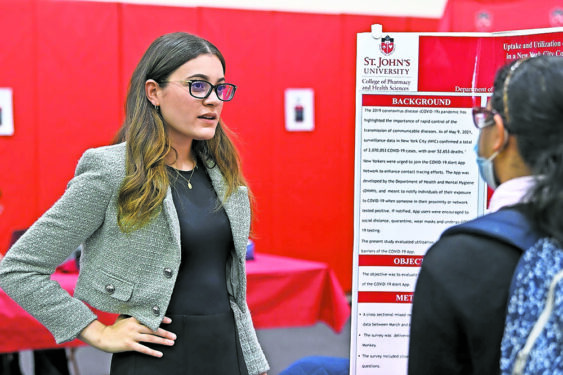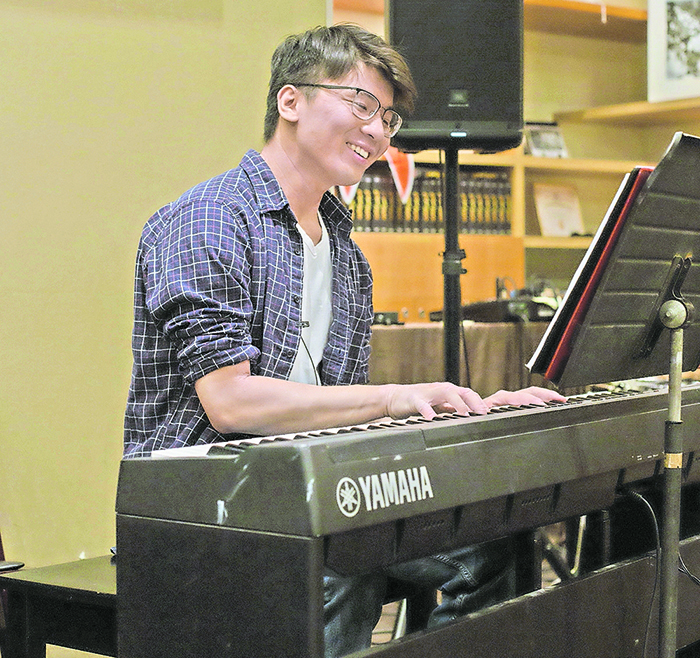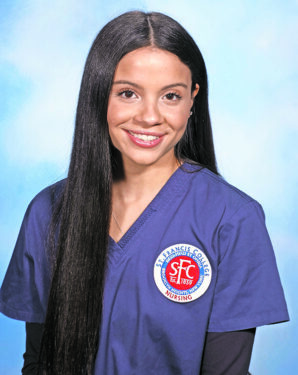
WASHINGTON — This year’s college graduates share one unique thing in common: Their college years were interrupted by the COVID-19 pandemic that started during their freshman year.
For many students in March 2020, this meant moving back home with their parents for a while, and for most, it meant taking classes online and being separated from friends and classmates. For all of them, it meant adapting to a completely new routine, just when they were getting used to the experience of being on their own for the first time.
To find out how the pandemic impacted college life for this year’s graduates, The Tablet talked to graduating seniors just before their May graduations from Fordham University in the Bronx, St. John’s University in Queens, and St. Joseph’s University and St. Francis College in Brooklyn.
Although these students had different experiences in their immediate pivot to online classes, they each came away from COVID-19’s intrusion on their college years sounding wiser for the wear.
The pandemic, while both initially scary and frustrating for them, also gave them time to reflect on what’s important and more deeply appreciate the sense of community they temporarily had to put on hold.
For Rachael Wattimena, who graduated with a double major in business administration and marketing at St. Joseph’s University, COVID-19’s outbreak in the U.S. occurred while she was on spring break with friends in Miami.
She said as they were watching the news, seeing Miami shut down and possible talk of New York City shutting down, they wondered if they would be able to get home, if they would have to be quarantined, and where they would go for the immediate future.

It turned out everyone was wondering what was next for quite some time, and St. Joseph’s, like most other colleges, quickly closed its campus and switched gears to online classes. Wattimena and her friends talked about how lucky they had been to be in a friend group that fall before everything changed the next semester.
She also experienced, during her first college internship that spring, what many workplace employees went through during the pandemic — not being in an actual office.
Wattimena, who is starting a job in commercial real estate after graduating, said she started the college job just before her spring break, then when she returned, she got a call from her boss saying they would be working remotely for two weeks, which ended up being six months.
For Miguel Sutedjo, who majored in music and international political economy with a minor in Mandarin and English from Fordham University, the pandemic’s shutdown forced his end-of-the-year performances in his freshman year to be “swept under the rug.
“It was very crazy and surreal to finish up the school year online,” he said.
But Sutedjo, who will be teaching English in Taiwan for the upcoming year on a Fulbright scholarship, also said that amid the strangeness of the pandemic he got something out of it.
“In a weird way, I did enjoy the unintentional break,” he said, adding that it forced him to reevaluate what he wanted out of college.
“It gave me breathing room. It was a very interesting couple of months and then years,” he said of moving back home and adjusting to online learning and then later to the mix of online and in-person classes.
“It all just helped me realize that I do really like performing but I need to find a balance,” with personal life too, something he said he is still trying to do. “COVID reaffirmed the value of community for me. As much as I love doing everything I do, it’s because of the people connected that make it worth it. Things don’t exist in a vacuum; it’s more fulfilling with others.”
Melissa Gonzalez, a nursing major and class valedictorian at St. Francis College, faced the initial challenge of taking interactive simulation nursing courses in one room at home while her high school sister and mom, a teacher, were in other rooms.

“We did the best we could; we made it work,” she said, of the sudden school-at-home arrangement, adding that she tried to be positive, realizing whatever they were doing was better than nothing.
When students were back in a hybrid model her sophomore year, but the pandemic was still going on, she had to do in-person lab work in full protective gear where she joked that she looked like an astronaut.
Gonzalez said she and her fellow students “endured a lot of change in four years,” and although the pandemic challenged them in ways they might never have imagined, she thinks the important thing now is to focus on what they ultimately learned from it.
That’s certainly true for Julissa Gomez, who graduated from St. John’s University with a degree in biomedical sciences. She not only learned from the pandemic, she learned about it and will continue to do so as she pursues her graduate degree in public health.
“My goal is to become what I call a ‘social epidemiologist,’ to investigate health disparities in minority populations, but also to do disease surveillance and discover how we can curtail the spread of diseases,” she said.
During college, Gomez worked on studies that looked at the impact of COVID-19 on the elderly and minority populations and those with diabetes, cardiovascular disease, or obesity.
She also studied how St. John’s students used an app that would quickly notify close contacts of a subject’s potential exposure to the virus that she said many students were wary of because of privacy issues.
For Gomez, the most challenging aspect may have been the online labs, but the idea that she was able to study and work on a health crisis as it was happening was amazing.
“It felt like I was making an impact on something so real,” she said.
Looking back though, she wonders “how we were all able to get through it,” adding: “It was difficult.”
